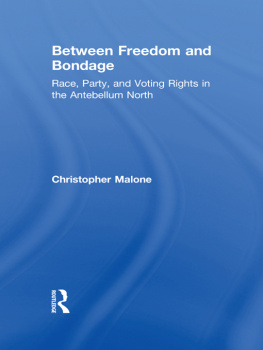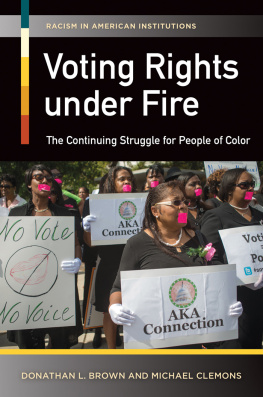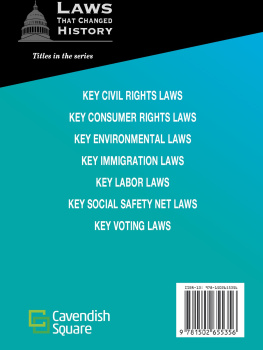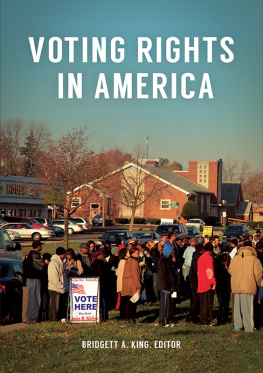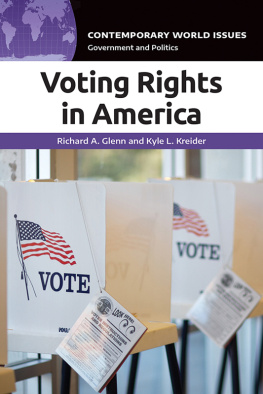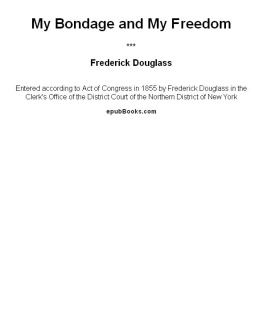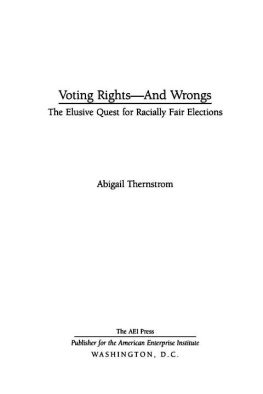Chapter 1 reprinted with permission from New Political Science , vol. 27, no. 2 (June 2005), pp. 177196.
Chapter 3 reprinted with permission, Journal of Pennsylvania History , volume 72, no. 4 (Winter): 468506.
| Published in 2008 by | Published in Great Britain by |
| Routledge | Routledge |
| Taylor & Francis Group | Taylor & Francis Group |
| 711 Third Avenue | 2 Park Square |
| New York,NY 10017 | Milton Park, Abingdon |
| Oxon OX14 4RN |
2008 by Taylor & Francis Group, LLC
Routledge is an imprint of Taylor & Francis Group, an Informa business
International Standard Book Number-13: 978-0-415-95697-0 (Softcover) 978-0-415-95696-3 (Hardcover)
No part of this book may be reprinted, reproduced, transmitted, or utilized in any form by any electronic,
mechanical, or other means, now known or hereafter invented, including photocopying, microfilming,
and recording, or in any information storage or retrieval system, without written permission from the
publishers.
Trademark Notice: Product or corporate names may be trademarks or registered trademarks, and are
used only for identification and explanation without intent to infringe.
Library of Congress Cataloging-in-Publication Data
Malone, Christopher.
Between freedom and bondage : race, party, and voting rights in the antebellum
North / Christopher Malone.
p. cm.
ISBN 978-0-415-95696-3 (hardback : alk. paper) -- ISBN 978-0-415-95697-0 (pbk. :
alk. paper)
1. African Americans--Suffrage--History--19th century. 2. African
Americans--History--To 1863. 3. African Americans--Politics and government--19th
century. 4. United States--Politics and government--1783-1865. I. Title.
JK1924.M35 2007
324.6208996073074--dc22 2007007661
Visit the Taylor & Francis Web site at
http://www.taylorandfrancis.com
and the Routledge Web site at
http://www.routledge.com
For Mom,
Who has taught me the meaning
Of strength
Of compassion
Of mercy
Of joy and sorrow
Of courage and intelligence
Of unconditional love.
Acknowledgments
Like many first books, this one began as a loose set of ideas during a frantic search for an original dissertation topic in the late 1990s while I was a graduate student at my wonderful alma mater, The City University of New Yorks Graduate Center. My dissertation was defended in late 2001 in a small room in midtown Manhattan as the ruins of the World Trade Center still smoldered to the south. That same year, I had also taken my first full-time teaching position at Pace University in New York, whose main campus is located just three blocks from Ground Zero.
Revisions to the manuscript were done primarily in those somber but compassionate New York days in the wake of 9/11. However, a good deal of the work was also completed during summer and winter breaks back home in my beloved New Orleans while visiting family and friends. The finishing touches were put on the work in the days and months after Hurricane Katrina chased my family, friends, and the rest of the noble people of New Orleans into exile. Eighteen months later as I write this, more than half the city has still not returned.
One will not find a discussion of either 9/11 or Hurricane Katrina in the pages that follow. And yet, the shadows of these two events cast themselves everywhere. For the sentences in this book were strung together through the tears and suffering of both 9/11 and Katrina. More aptly, it was written in the space in my mind between New York and New Orleans.
It may be said that, in the dawn of the twenty-first century, all of us in the United States live between these two eventsbetween 9/11 and Katrinaand these two citiesbetween New York and New Orleans. My adult life has been spent between them. Despite the tragediesand, in many ways, because of these tragediesI am blessed to call these two great American cities home.
I want to thank first and foremost my family. Although far away and perhaps unsure of what exactly it is I do from day to day, they are always with me. The pride they may feel in having the first member of their clan publish a book pales in comparison to the love and strength I have received from them over these years.
I want to thank the Dyson College of Arts and Sciences at Pace University for providing funding and release time for research and writing. I also want to acknowledge some of my wonderful colleagues at Pace University who have made me a better teacher and scholar through the endless conversations about politics and life. Most especially, Greg Julian, the chair of my department who is responsible for bringing me to Pace, and Meghana Nayak, my officemate and travel-course buddythank you both for your friendship and your love.
Because this project began as a dissertation, I would like to acknowledge the numerous colleagues going back to my grad school and teaching days at CUNY who have commented and provided excellent feedback on parts of the manuscript at dissertation workshops, conferences, colloquia, and seminars. First among firsts on this list is Frances Fox Piven. Without her guidance and mentoring, I would not be where I am or who I am todayit is as simple as that. I came to the CUNY Graduate Center to study under her. It is rare that you meet someone who is actually nicer, funnier, more caring, more charming, and more intelligent in real life than they are in the books they write. So it is with Fran Piven. I learned from her that teaching, mentoring students, producing solid scholarship, and engaging in the struggles of politics are not mutually exclusive things. Alas, after years of her mentorship, I am most proud to call her friend.
I also thank all of my friends and colleagues who sat with me at the Roundtable at Fran Pivens Upper Westside apartment month after month for her now famous Dissertation Workshop Dinners/Meetings. It was peculiarly refreshing to know you could eat a great home-cooked meal while having your intellectual work shredded apart by a smart and lovely bunch of peopleand nonetheless leave with a smile on your face.
I also would not have made it through the demands of graduate school without the direction and friendship of Andy Polsky, who over the course of my days as an adjunct at Hunter College taught me how to be a better teacher and a better scholar. To his current and former students, Andy is best known for his meticulous scholarship and his legendary red pen. He went through dozens of them on draft after draft of my own workwhich no doubt made it better, sharper, more nuanced.
There were many colleagues in the field who commented on parts of this work over the years at conferences and other opportunities where I had the chance to present my work. Ira Katznelson, Ruth OBrien, Joan Tronto, all the members of the New York Colloquium on American Political Development, Tali Mendelberg, Phillip Klinkner, Richard Valelly, to name a few.

